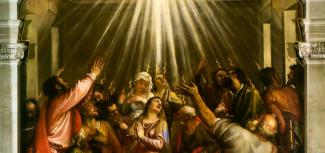The Power of Pentecost in Vocation and Globalization

By Joseph Sunde
Given the dynamics of the information age and ever-accelerating globalization, humanity faces a wave of new opportunities and challenges when it comes to creating, collaborating, and consuming alongside those in vastly differing contexts.
Pentecost Sunday has already past, but it’s a great time to reflect on the incredible shift that occurred, and its ripple effects into these sorts of areas, particularly as they relate to Christian vocation. Most simply, in a diverse, globalized economy, how do we unify around the true and the good while retaining our God-given distinctiveness?
“Life and work in the twenty-first century is more complex than ever,” writes theologian Amos Yong. “In our so-called ‘information age,’ what to know and how to act upon what appears to be dynamic knowledge databases paralyze even those who are most dedicated to living well and bearing faithful Christian witness in our time. Not only is there so much to know, but there are so many modalities of coming-to-know and so many perspectives from which knowledge is communicated.”
Globalization has been an incredible blessing, and for Christians, it raises exciting new questions about Christian witness. As we work and do business, trade and exchange, with our brothers and sisters across the world, touching multiple cultures, countries, and languages, often in a single day, how do we align our service accordingly? As Yong asks, “How then do we not only make sense of our lives but also bear adequate vocational witness in our pluralistic age?”
The answer, he continues, can be found at Pentecost:
A look backward to the biblical day of Pentecost event might help us understand the polyphony of our world and empower wise witness in the public sphere. What I am referring to is the remarkable phenomenon of the Holy Spirit’s outpouring “on all flesh” (Acts 2:17b) that both empowered the diversity of tongues (Acts 2:2-11) and simultaneously precipitated the declaration of “God’s deeds of power” (Acts 2:11b). From this, we see that the multiplicity of voices is not in and of itself a problem; in fact, such plurivocity may well be a work of the Spirit of God in the present time. It is precisely in and through the many tongues of Pentecost that the glory of God is both manifested and mediated.
Pentecost happened for a reason, and not so the church could just relish in the gifts in confined quarters or specially designated places. As we continue to create and collaborate and consume alongside diverse persons in widespread geographic and cultural landscapes, we have ever-increasing opportunities to seek the unifying power of the Holy Spirit.
The Holy Spirit calls specific people to specific tasks, each contributing to a beautiful tapestry of creativity across social, economic, and cultural lines. Throughout that diversity and across the fabric of civilization, the Spirit has the power to weave and connect, to unify and enrich, to empower and transform God’s people and all of creation in profoundly mysterious ways:
Our pursuits of genuine, open relationships with others will certainly influence us but also be a possible catalyst for others to reconsider who they themselves are. This results not just from the mutuality that characterizes all authentic relationships but also from the fact that, as Christians who are shaped deeply by the image of God in Christ, finally our witness will be, as it was on the Day of Pentecost, both cruciform and theocentric. It may even involve a parting of ways.
But the promise of Pentecost is at least threefold: 1) we will be able to bear adequate witness to the living God in surprising relationship to others; 2) others may well be invited to repent and reconsider their life trajectories in light of our relationship; and 3) whether or not that happens, there is no relationship in the Spirit of Christ that will not also transform us in the process.
Jesus called us to go into all the world and preach the Gospel, and working in the service of others is a big part of that witness. As globalization and interconnectedness accelerate — as we continue to innovate, collaborate, and trade with new partners from new perspectives — the church should be acutely aware of and in eager anticipation of the mysterious and unifying work of the Spirit throughout the process.
For more, see Flourishing Churches and Communities, Dr. Charlie Self’s Pentecostal primer on faith, work, and economics.
- Log in to post comments
